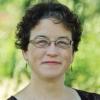
Sociologist Robert A. Scott explains in his prologue to Miracle Cures that he is a proponent of modern scientific medicine and that he is not a religious person. But if his inquiry into Christianity’s healing shrines seeks biomedical and psychological causes underlying claimed miracle cures, it is marked by a respect for the faithful -- especially those in centuries past for whom embarking on a pilgrimage may truly have had more health benefits than what passed for medicine at that time.
While Scott also discusses early modern and contemporary Catholic healing shrines (Lourdes, of course, being prominent), the bulk of his attention is given to the phenomenon in medieval Europe, where chronic malnutrition depressed the immune system and poor sanitation encouraged the spread of disease, and amid all this, illness was viewed as God’s punishment for sin.
 MIRACLE CURES: SAINTS, PILGRIMAGE, AND THE HEALING POWERS OF BELIEF
MIRACLE CURES: SAINTS, PILGRIMAGE, AND THE HEALING POWERS OF BELIEF
By Robert A. Scott
Published by University of California Press, $24.95
Many common infectious illnesses at that time may have naturally run their course whether or not the sufferer had gone to appeal to a saint. However, a pilgrimage offered changes in diet, climate and living conditions, and, in bonding with fellow travelers, a temporary relief from the shame associated with disease. Scott draws on modern scientific studies on the placebo effect and on various ways that thoughts, beliefs and actions can give a boost to the immune system to illustrate how pilgrims may have begun to effect their own healing from the day they began packing.
What mattered was that it worked, which perhaps has led to the enduring attraction to healing shrines. As Scott notes in his engaging, compassionate book, “If the sufferers went on pilgrimage, prayed to a saint, and in the end felt better for it, it does not matter whether the recovery was due to spontaneous remission or the natural course of illness. From the pilgrims’ point of view, they took action, and it made them feel better; therefore they concluded that what they did had helped.”
 BEYOND BLUE: SURVIVING DEPRESSION & ANXIETY AND MAKING THE MOST OF BAD GENES
BEYOND BLUE: SURVIVING DEPRESSION & ANXIETY AND MAKING THE MOST OF BAD GENES
By Therese J. Borchard
Published by Center Street, $21.99
Therese Borchard has a mission in her book Beyond Blue -- as well as in her Beliefnet.com blog of the same name: bringing the light of hope to those suffering from mental illness, and working to remove the stigma associated with it.
To this end, she tells her own story, as a woman, wife and mother who suffers from bipolar disorder, depression, addiction, anxiety and other illnesses. While self-help suggestions and medical research appear throughout Beyond Blue, the book is at its most affecting as a personal memoir -- honest, often funny, and sometimes harrowing.
Borchard’s faith is a constant thread, even if, she says, “I have cussed out God too many times to count, asking him what kind of marijuana he was smoking the day he designed my brain.”
Being Catholic, she writes, “was both a blessing and a curse. ... I’ve always maintained that Catholicism is the most suitable religion for the mentally ill. Think about it. There is a saint for every neurosis.”
The curse side is most evident in her childhood, when her intense devotion and anxiety about pleasing God “disguised a serious mood disorder as piety.”
As an adult, she directs some barbs at New Age friends who encouraged her to think her way out of mental illness. But she has just as little regard for one psychiatrist -- nicknamed “Pharma King” -- who had her taking 16 heavy-duty pills a day.
Borchard came to accept that a holistic approach can include medication as well as exercise, diet, sleep, prayer and meditation. She embraces every tool that works in her “chase after sanity each day.”
[Teresa Malcolm is NCR special sections editor. Her e-mail address is tmalcolm@ncronline.org.]
Stories in this Health & Well-being series
Advertisement |

